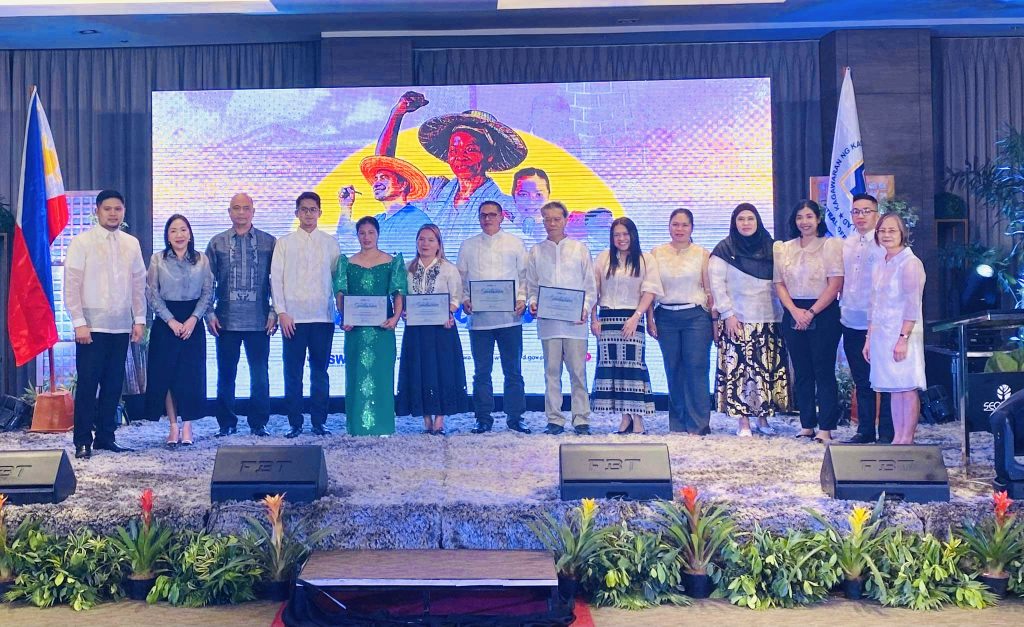The Kapit-Bisig Laban sa Kahirapan Comprehensive and Integrated Delivery of Social Services (KALAHI-CIDSS) celebrated its 20th foundation by gathering volunteers in a Community-Driven Development (CDD) Congress held on November 27-29, 2023, at the Sequoia Hotel, Manila. The theme for this year’s Conference was “Dalawang Dekadang Serbisyo, pagsibol hanggang sa pagpapatuloy,” aimed at continuing the gains of the CDD strategy in improving access to basic services in poor communities through empowerment.
The congress collected many lessons learned, good practices, and success stories from interactive sessions and activities participated by over 300 delegates from 15 KALAHI-CIDSS implementing regions. Community volunteers were consulted to enhance operational strategies toward more effective community organizing in the KALAHI-CIDSS program.

Empowering people as partners of development
Since 2003, 99.45 billion worth of investment, both from foreign and local funding, paved the way to completing 76,410 subprojects across the country, benefiting 21.64 million households and engaging 2.40 million community volunteers. Using the CDD strategy, the program banks on people’s participation, treating them as assets and partners in development, not mere targets of development projects.
“For me, the most important aspect of KALAHI-[CIDSS] is the empowerment…You work with communities to teach them that they have a voice; that you can actually participate in decision-making and that you will be listened to,” said Ditte Fallasen, Senior Social Development Specialist from The World Bank. She also challenged community volunteers to amplify their voices within their Local Government Units (LGUs).
“Giving you a voice will hopefully also empower you to go to your municipal LGUs and advocate for your communities. Make sure that your priority needs are reflected in municipal development planning; that the funding set aside for development activities will actually reflect the real needs on the ground,” she added.
Primary stakeholders of KALAHI-CIDSS, called community volunteers, are capacitated in identifying their priority needs and consequently provided relevant trainings in subproject implementation. Training on project development, finance, procurement, engineering, subproject operation and maintenance empower ordinary villagers to deliver and maintain chosen priority projects. As a result, residents develop a sense of ownership and pride in the projects implemented.
Volunteerism in KALAHI-CIDSS
The Philippine National Volunteer Service Coordinating Agency (PNVSCA) affirms the valuable contribution of community volunteers engaged in KALAHI-CIDSS. Some volunteers have been with the program as far as 19 years, demonstrating unwavering commitment to the development objectives of the program. Long-time volunteers shared that the challenge today is encouraging new volunteers to come in and take part in community-driven development.
“Maganda yung volunteerism kasi nagbibigay siya ng platform para mag engage ang private sectors sa mga programa ng government, and I think KALAHI-CIDSS is a good platform for that. Nabibigyan ng opportunity na mag work yung different sectors and nagkakaroon ng sense of ownership ang mga tao sa mga programa ng government kasi involved ka,” said Ms. Maribel F. Larracochea, PNVSCA Senior Volunteer Service Officer.
Republic Act 9418 promotes the practice of volunteerism as a way of life among Filipinos and the time-honored tradition of Bayanihan to attain national development. In KALAHI-CIDSS, community volunteers receive no compensation, often sacrificing their time, skills, and energy toward advancing the program’s objectives. The program believes that the poor and marginalized sectors can become active agents of change rather than passive beneficiaries. Sustaining volunteerism and ensuring continuous community engagement remains an ongoing endeavor of the program, given the many challenges community volunteers face.
CDD Institutionalization
KALAHI-CIDSS is campaigning for CDD institutionalization at the national level through the CDD Bill. Locally, the program advocates CDD adoption in KALAHI-implementing LGUs, encouraging the enactment of municipal ordinances that integrate CDD principles, practices, and mechanisms in the local planning process.
Occidental Mindoro Governor and CDD champion Ed Gadiano challenged local chief executives present during the congress to see CDD institutionalization as a pivotal step to achieve participatory and inclusive governance.
“Kung talagang mahal natin at gusto natin ang ganitong proseso ng pagbabago na galing sa tao at para sa tao, i-institutionalize natin… Sana dun natin makita yung output natin na na-empower yung mga tao, na reduce natin ang poverty; at magpapatuloy ito kahit wala na ang leader dahil institutionalized na,” he said in a touching speech.
“Ito yung hamon sa atin na naniniwala sa CDD, na makumbinse natin ang ating mga Congressmen at Senador.” He said that if lawmakers are oriented about the work and advocacy of KALAHI-CIDSS, institutionalizing CDD would not be an uphill battle.
Pagkilos—Community-Driven Climate Action
With the expected closing of the National Community-Driven Development Program Additional Financing in 2024, KALAHI-CIDSS explores a follow-on project to improve the resiliency of poor and vulnerable communities to climate change. The intervention includes building climate-smart structures that protect communities against the perils of climate change while also promoting sustainable livelihood.
The fundamental tenet of CDD is the understanding that communities are not only at risk from climate change but also play a significant role in developing solutions. Local communities possess invaluable knowledge about their environments, weather patterns, and traditional practices that have sustained them for generations. Moreover, their solid experience in subproject management will be useful in delivering high-impact infrastructures that can withstand the adverse effects of climate change.
The new project development objective is proposed to empower communities in targeted municipalities to achieve locally-led climate resilience actions and participate in more adaptive and shock-responsive local planning, budgeting and implementation. In a 2017 report, the National Integrated Climate Change Database and Information Exchange System reports that the Philippines is the third most vulnerable country to climate change.


